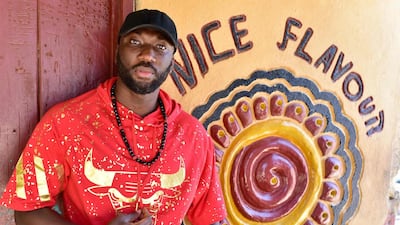For a musician used to receiving anonymous death threats with the release of every new single, Emmerson Bockarie laughs a lot.
The Sierra Leonean pop star, a thorn in the side of successive governments over his 15-year career, chuckles as he recalls the countless times politicians have sought to dampen his appeal.
"Politicians make mentions of my music on TV and radio. That means they hear the songs and are getting the message," he says.
Known simply as Emmerson, the Afrobeat singer is the bete noire of Sierra Leone's music scene, one of few successful artists who refuse to play political rallies or back a party in a nation where rappers and singers are co-opted for their youth appeal. With a new president expected to be elected on Saturday, Bockarie says he expects fresh inspiration for his soft yet scathing lyrics – whoever wins – as the ruling All Peoples' Congress faces off against the main opposition Sierra Leone Peoples' Party. The two parties have ruled the country alternately since independence in 1961.
"I stand with the people; I am with the country," he says. "It makes no sense for me to belong to a party."
Emmerson began making music in the local Krio language after Sierra Leone's civil war ended in 2002, when he had just left school. His first single Yu Go See Am ridiculed government officials stuffing their faces and skimming money off state funds while ordinary citizens went hungry.
"The president, Ahmad Tejan Kabbah, was like: it's better for them to sing than to go back to the bush and be rebels," he says, referring to the legions of child and youth soldiers.
Today he is heavily engaged in civic education, collaborating with four other artists on the song Mi vote na mi life last year to encourage voters split along tribal and regional lines to consider policies when making a choice.
"Emmerson songs are about issues affecting ordinary people," says Murtala Mohamed Kamara, publisher of the Salone Jamboree. "He has been consistent with his criticism and advocacy for change without bias to any government," he says. A typical Emmerson song will encompass mockery of politicians' greed, tributes to Sierra Leone and its long-suffering people, and some element of hope for the future.
His lyrics about poverty – “wi weh no born mit money/ less opportunity/ still wi wan be somebody/ e no easy eh” – reflect the frustrations of young people in a country with high unemployment and enduring social injustice.
"I started listening to Emmerson's music in 2007, and I still love him for telling the truth," says Ophaniel Gooding, a fan. But his successful songs have made him some powerful enemies. "I know there are propaganda machines out there organised by the government to go against my music on social media," Emmerson says.
“Sometimes you have phone calls, text messages, Facebook ... ‘We will light you up. If I ever see you that will be your last day’,” he says.
And that is before his much-publicised war of words with outgoing President Ernest Bai Koroma, who is accused of failing to address corruption and the economic fallout of the 2014-2016 Ebola crisis.
"The president referred to me as a fly, that he would just blow me off," Emmerson says, with a dismissive flick of the hand.
Emmerson got his revenge by sampling a soundbite of Koroma's hand-picked successor, Samura Kamara, in the opening strains of his election-inspired hit Good Do. The former foreign minister admitted during a campaign debate that the ruling party was responsible for deplorable conditions in parts of the country. "I blame the government," Kamara says, before Emmerson is recorded laughing over the presidential candidate's words.
The singer sincerely believes he provides an information service for citizens. But the fierce pride of his fans takes a toll. He is separated from his wife, blaming the all-consuming nature of his music, and admits he has no time for himself.
Technology has also complicated his life. Previously he relied on CD and cassette sales to make money, and although YouTube and iTunes have given him a global reach, locals are now more likely to pirate his music.
He is currently concentrating his energies on a label, Sugar Entertainment, that is nurturing a new generation of artists.
But what motivates him on a daily basis is his dream for Sierra Leone, for a nation free of injustice and ethnic conflict, with jobs for everyone and a freer political system. But he won't be the one to lead his people to this brighter future. "If I go into politics who would be doing what I'm doing? We need me," he says.
_______________
Read more:
Palestinian singer and poet Rim Banna transformed pain into art
Singer-songwriter Danny Aridi says you can get a lot done by collaborating
Emirati composer Ihab Darwish on the very personal story behind 'Waves of My Life
_______________

